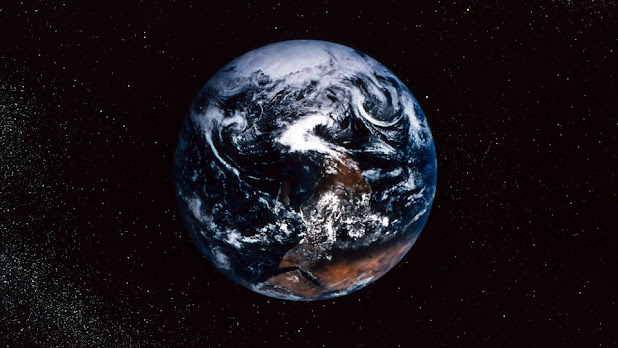Melting Polar Ice Alters Earth’s Rotation, Leading to Time Adjustment
Polar ice is melting and changing Earth’s rotation. It’s messing with time itself
Universal History Archive/Getty Images
View of the planet from space. Global warming has led to so much polar ice melt that it is affecting the speed at which the Earth rotates
Introduction:
A groundbreaking study reveals that melting polar ice is influencing Earth's rotation, prompting the need to adjust timekeeping worldwide. The intricate relationship between polar ice melt, Earth's core dynamics, and global timekeeping mechanisms underscores the profound impact of human activity on the planet.
Background:
Earth's rotation serves as the bedrock for our measurement of time, with its consistency essential for various aspects of modern life, from global communication to financial transactions. Historically, humanity has relied on the Earth's rotation to delineate the passage of time, with sundials and astronomical observations providing primitive means of timekeeping. However, with the advent of precise atomic clocks and the establishment of coordinated universal time (UTC) in the late 1960s, the world transitioned to a more standardized and accurate method of time measurement. UTC, based on atomic time, operates in tandem with Earth's rotation, ensuring synchronization across time zones.
The Story:
Recent findings indicate a significant shift in Earth's rotation due to melting polar ice and changes in the planet's core dynamics. The acceleration of Earth's rotation, attributed to core dynamics, necessitates the subtraction of a second from global timekeeping—a unprecedented occurrence. This adjustment, known as a "negative leap second," marks a departure from the historical trend of adding leap seconds to compensate for the gradual slowing of Earth's rotation. The study's lead author, Duncan Agnew, emphasizes the implications of this shift, highlighting the unforeseen challenges it poses to global timekeeping systems.
Key Players:
• Duncan Agnew: Professor of geophysics at the University of California San Diego and author of the study. Agnew's research sheds light on the complex interplay between polar ice melt, core dynamics, and Earth's rotation.
• Patrizia Tavella: Member of the Time Department at the International Bureau of Weights and Measures. Travellers insights into timekeeping mechanisms provide crucial context for understanding the significance of the study's findings.
• Ted Scambos: Glaciologist at the University of Colorado Boulder. Scambos' expertise in polar ice dynamics offers valuable perspectives on the impact of melting ice on Earth's rotation.
Significance:
The study's findings underscore the unprecedented impact of melting polar ice on Earth's rotation and timekeeping systems. This shift not only highlights the vulnerability of Earth's natural systems to human-induced climate change but also emphasizes the far-reaching consequences of environmental degradation on technological infrastructure. As society becomes increasingly reliant on precise timekeeping for activities ranging from telecommunications to financial transactions, the need to recalibrate global timekeeping mechanisms becomes more pressing.
Reactions:
Initial reactions to the study vary, with some experts expressing concern about potential disruptions to computing systems and global time synchronization. The prospect of reprogramming computer systems to accommodate the subtraction of a leap second raises logistical challenges and underscores the need for proactive measures to mitigate potential errors. However, others emphasize that for the majority of people, daily life will likely proceed unaffected by the time adjustment, highlighting the resilience of human society in adapting to environmental changes.
Looking Ahead:
The study's implications extend far beyond the realm of timekeeping, serving as a poignant reminder of humanity's impact on the planet's natural systems. Continued monitoring of polar ice melt and core dynamics is essential for understanding future changes in Earth's rotation and devising strategies to mitigate environmental consequences. Moreover, the study underscores the urgent need for collective action to address climate change and its far-reaching effects on Earth's fundamental processes. As society grapples with the challenges posed by a rapidly changing climate, initiatives aimed at reducing greenhouse gas emissions and preserving Earth's polar ice caps take on heightened significance. Ultimately, the study serves as a call to action for global cooperation in safeguarding the planet for future generations.
Disclaimer:
The information provided in this summary is based on an interpretation of the news article "Polar ice is melting and changing Earth’s rotation. It’s messing with time itself" published by an external source. While efforts have been made to accurately convey the main points and key details of the article, this summary is not a direct reproduction of the original text. Readers are encouraged to consult the original news article for a comprehensive understanding of the topic.
Original News Article Link: Polar ice is melting and changing Earth’s rotation. It’s messing with time itself
Please note that the views and opinions expressed in the original news article are those of the author(s) and do not necessarily reflect the views of the author of this summary or the platform on which it is published. Additionally, any errors or inaccuracies in the summary are unintentional and should be attributed to the summarization process. Readers are encouraged to verify information from multiple sources and consult experts in the field for further clarification.




Comments
Post a Comment